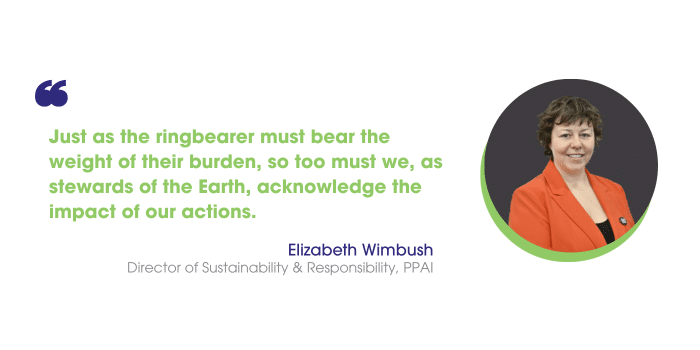In the realm of sustainable business practices, there’s a powerful tool that often goes unnoticed, much like the ring in the pocket of a certain hobbit.
It’s called a life cycle assessment, and it holds the key to understanding the environmental impact of our everyday actions, including the production and distribution of promotional products.
What’s An LCA?
An LCA is a comprehensive analysis of the environmental impact of a product or service throughout its entire life cycle. This includes everything from the extraction of raw materials and manufacturing processes to distribution, use and disposal.
At the heart of the life cycle assessment lies the concept of the “One Ring,” a symbol of power and responsibility. Just as the ringbearer must bear the weight of their burden, so too must we, as stewards of the Earth, acknowledge the impact of our actions.

The LCA serves as our guide, revealing the hidden paths and pitfalls of our supply chains, from the mines of Moria to the forges of Mordor. But fear not – like Frodo and Sam on their journey to Mount Doom, we’re not alone. With the fellowship of stakeholders by our side, we can navigate the treacherous terrain of sustainability, armed with the knowledge provided by the assessment.
Why Do LCAs Matter?
LCAs offer valuable insights into the environmental footprint of promotional products. By examining each stage of a product’s life cycle, we can identify areas where environmental impacts are most significant and develop strategies to minimize them. This not only benefits the planet but also enhances the reputation of companies as environmentally responsible.
Life cycle assessments also help companies comply with environmental regulations and standards. With governments worldwide tightening regulations on carbon emissions, waste management and resource conservation, LCAs provide valuable data to ensure compliance and avoid costly penalties.
But perhaps most importantly, LCAs empower companies to make informed decisions that drive positive change. Armed with data on environmental impacts, companies can identify opportunities for innovation and resource efficiency, leading to cost savings and reduced environmental footprints.
Start Your Own LCA
How can a company go about launching its own life cycle assessment? Here are some simple steps for your quest:
1. Define Your Goals: Clearly outline what you want to achieve with the assessment. Are you looking to reduce carbon emissions, minimize waste or improve resource efficiency? Setting clear goals will help guide the rest of the process.
2. Gather Data: Collect information on the materials, energy and resources used at each stage of your product’s life cycle. This may involve reaching out to suppliers, conducting surveys or using existing data sources.
3. Assess Impacts: Analyze the environmental impacts associated with each stage of the life cycle. This includes assessing factors such as greenhouse gas emissions, water usage, air pollution and waste generation.
4. Identify Opportunities: Use the findings of the LCA to identify opportunities for improvement. Are there areas where you can reduce energy consumption, switch to more sustainable materials or optimize transportation routes?
5. Take Action: Implement changes based on the findings and recommendations from the assessment. This may involve redesigning products, perfecting processes or investing in renewable energy sources.
6. Monitor And Review: Continuously monitor the environmental performance of your products and revisit the LCA periodically to assess progress. Use feedback from stakeholders and customers to refine your approach and drive further improvements.
Seek Assistance
When it comes to conducting a life cycle assessment, you may want to enlist the help of a specialized consultancy or environmental research firm. These companies have the expertise and resources to conduct comprehensive LCAs tailored to your specific needs.
Look for firms with experience in sustainability consulting, environmental science or life cycle assessment. They can guide you through the process, provide technical ability and help you interpret the results of the LCA to drive meaningful change within your organization.
Although it’s not quite as perilous as a journey to Mordor, having the right companions makes all the difference. In essence, life cycle assessments serve as our Gandalf, guiding us through the darkness of uncertainty toward the light of quantifiable, data-driven sustainability decisions. By embracing this powerful tool, our industry can embark on its own quest.
Let us heed the call to adventure, armed with the knowledge and wisdom provided by LCAs, and pave the way for a greener, brighter tomorrow in our own Middle-earth.
Wimbush is the director of sustainability and responsibility at PPAI.


